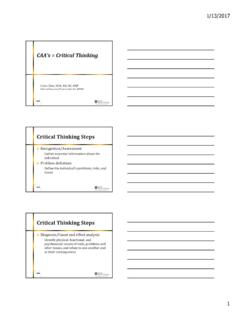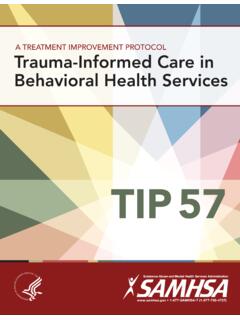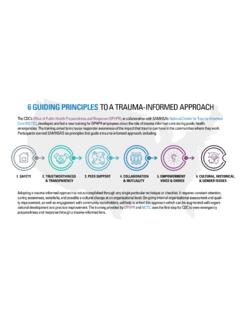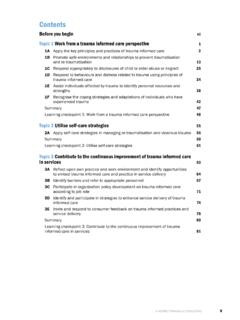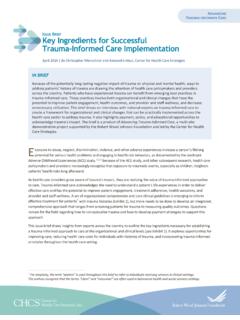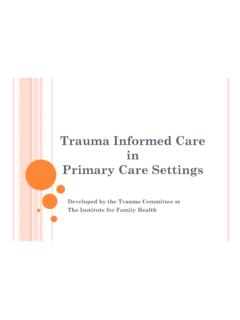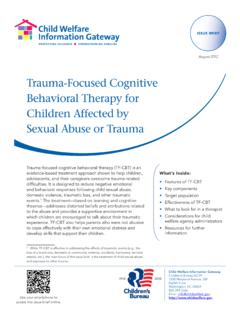Transcription of TRAUMA INFORMED CARE - Nursing Home Help
1 10/21/20191 MELODY SCHROCK, BSN, RN, RAC-CTKATY NGUYEN, MSN, RNOBJECTIVES Understand about TRAUMA treatment and TRAUMA - INFORMED care Understand the regulatory requirements related to TRAUMA - INFORMED care Understand the best practices and approaches to TRAUMA - INFORMED care Understand how person-centered care is important for TRAUMA - INFORMED care Understand assessment and care planning10/21/20192 WHATISTRAUMA Results from an event, series of events, or set of circumstances that is experienced by an individual as physical or emotionally harmful or life threatening and that has lasting adverse effects on the individual s functioning and mental, physical, social, emotional, or spiritual well-being (SAMHSA, 2014).
2 WHYTRAUMA-INFORMEDCARE?F699: (m) TRAUMA - INFORMED care The facility must ensure that residents who are TRAUMA survivors receive culturally competent, TRAUMA - INFORMED care in accordance with professional standards of practice and accounting for residents experiences and preferences in order to eliminate or mitigate triggers that may cause re-traumatization of the resident. Will be implemented beginning November 28, 2019 F659 qualified persons F699 TRAUMA INFORMED care (effective 11/28/2019) F741 sufficient competent staff, behavioral health needs F740 behavioral health services F742 treatment/services for mental-psychosocial concerns F743 no pattern of behavioral difficulties unless unavoidable 10/21/20193 Behavioral Health Services For residents with documented history of TRAUMA and/or post-traumatic stress disorder.
3 The facility must provide treatment and services to address problems/improve well-being For residents with no documented history of TRAUMA and/or post-traumatic stress disorder: The facility must prevent residents from becoming less socially interactive or more withdrawn, angry or depressed (unless these behaviors cannot be avoided due to a clinical condition) Staff must be equipped to care for residents with history of TRAUMA and/or post traumatic stress disorder Comprehensive person-centered care planningServices must be both culturally-competent and TRAUMA - INFORMED Quality of care care must be delivered in a way that is culturally-competent and TRAUMA -informedWHYTRAUMA-INFORMEDCARE?
4 The ACE Pyramid10/21/20194 ADVERSECHILDHOODEXPERIENCES(ACES) Domestic and sexual violence Natural disasters Car, train and airplane crashes Military combat Becoming a refugee Homelessness Medical TRAUMA Violent crime Bias and discrimination Hate crimes and hate speech Childhood physical, emotional and sexual abuse Childhood neglect and abandonmentTRAUMASRELATINGTO THEAGINGPROCESS Loss of loved ones; Loss of own capacities; Loss of roles and identity and of home; Increased dependence; Experiencing or observing physical, sexual,and emotional abuse; Childhood neglect; Having a family member with a mental health or substance use disorder; Experiencing or witnessing violence in the community or while serving in the military.
5 Poverty and systemic discrimination10/21/20195 WHATISTRAUMA-INFORMEDCARE TRAUMA INFORMED care is an approach that aims to engage people with histories of TRAUMA , recognize the presence of TRAUMA symptoms, and acknowledge the role that TRAUMA has played in their lives (SAMHSA,National Center for Tr a u m a I n f o r m e d C a r e, 2014) TRAUMA - INFORMED care is defined as practices that promote a culture of safety, empowerment, and healing Tr a u m a Tr e a t m e n t o r Tr a u m a Specific Services (TSS) are programs, interventions, and therapeutic services aimed at treating the symptoms or conditions resulting from a traumatizing event(s).
6 (Oregon health department) TRAUMA INFORMED care (TIC) is an approach, based on knowledge of the impact of TRAUMA , aimed at ensuring environments and services are welcoming and engaging for service recipients and staff. (Oregon health department)TRAUMATREATMENTANDTRAUMA-INFO RMEDCARE10/21/20196 TYPESOFTRAUMA Stress: any experience that disrupts our sense of well-being. Tr a u m a : an intense event that threatens safety or security of an individual. Toxic Stress: recurring negative experiences that threaten safety or security. Acute TRAUMA : a single, time-limited traumatic event. Chronic TRAUMA : multiple traumatic exposures/events over an extended period of time.
7 Traumatic Stress: long term reaction to TRAUMA ; refers to the combination of the event, the individual s experience/perception and the effects. Complex TRAUMA : experience of multiple traumatic events & impact of that experience. TRAUMA and Stressor-Related DisordersTRAUMA-TOXICSTRESS10/21/20197 SYMPTOMSOFTRAUMAP hysical signs and symptoms of TRAUMA including shaking or trembling, inability to pay attention, sleep disturbances such as insomnia, and a racing heartbeat, pains, tense their musclesBiologicalsymptoms include brain function, headaches, stomach aches, sleep changes Socialsymptoms include apathy, isolation, difficulty trusting, detachment Spiritualsymptoms include struggle to find meaning, anger with God Emotional or psychological symptoms Anger, irritability, mood swings.
8 Including emotional or violent outbursts. Anxiety and fear. Panic attacks. Guilt, shame, self-blame. Withdrawing from others. Feeling disconnected or numb. Obsessive and compulsive NOTMENTALILLNESSS imilar symptoms that usually misdiagnosis or Dementia Psychosis Personality disorders Mood disorders bipolar, depression Oppositional willful misconduct Hoarding is actually correlated to childhood physical or sexual abuse10/21/20198 SYMPTOMSFROMIMMEDIATEANDDELAYEDREACTIONS TOTRAUMA Initial reactions to TRAUMA can include exhaustion, confusion, sadness, anxiety, agitation, numbness, dissociation, confusion, physical arousal, and blunted affect (Samsha, Tip 57)
9 Delayed responses to TRAUMA can include persistent fatigue, sleep disorders, nightmares, fear of recurrence, anxiety focused on flashbacks, depression, and avoidance of emotions, sensations, or activities that are associated with the TRAUMA , even remotely (Samsha, Tip 57)SYMPTOMSFROMIMMEDIATEANDDELAYEDREACTI ONSTOTRAUMA10/21/2019910/21/201910 TRAUMASCREENING TRAUMA -related symptoms. Depressive or dissociative symptoms, sleep disturbances, and intrusive experiences. Past and present mental disorders, including typically TRAUMA -related disorders ( , mood disorders). Severity or characteristics of a specific TRAUMA type ( , forms of interpersonal violence, adverse childhood events, combat experiences).
10 Substance abuse. Social support and coping styles. Availability of resources. Risks for self-harm, suicide, and violence. Health Brief TRAUMA Questionnaire (BTQ)is a ten-item self-report TRAUMA exposure screen that can be quickly administered and is suitable for special populations such as persons with severe mental illness as well as for general population groups Upsetting Events Surveyis a modification of the Traumatic Life Events Questionnaire (TLEQ). It assesses effectively for TRAUMA history PTSD Checklist (PCL)is a self-report rating scale. The PCL contains seventeen questions that map onto the three DSM-IV PTSD symptom clusters: re-experiencing, avoidance, and arousal Beck Depression Inventory-IIis a well-validated self-report scale for depression that has been used with a wide range of different populations and disorders10/21/201911 The FRAIL Questionnaireassesses five components.









